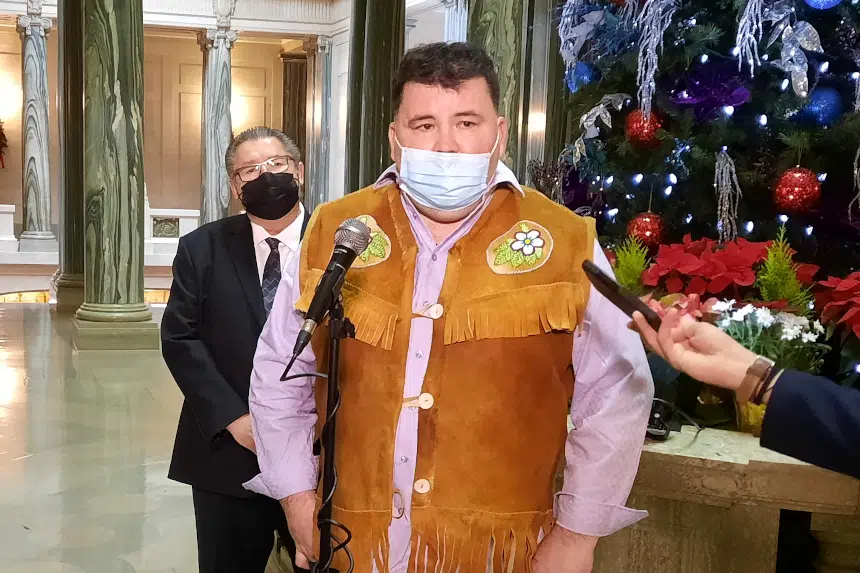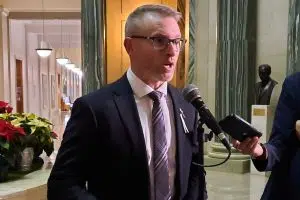While the pandemic has been hard for many people, in northern Saskatchewan — where they already had been dealing with a suicide and addictions crisis — the situation surrounding COVID-19 has only made it worse.
Devin Bernatchez is a councillor for the Lac La Ronge Indian Band for the community of Sucker River. He made his way to the legislative building on Monday, joining NDP MLA Doyle Vermette.
There, Bernatchez asked for help from the provincial government.
“We’ve always been wanting to have a spirit of partnership with the (Saskatchewan Health Authority). As you know, during the pandemic, we were a partner with them with the public health order. We wanted to support their initiative, support their ideas. And that’s what we’re looking for here today,” said Bernatchez.
He said suicides and drug addictions have gone up. There have been a few people who’ve died by suicide in the last month or two, and it has ripple effects with other people making attempts.
“We’re in a crisis right now. And I think if we don’t tackle it now, then we’re going to see more negative stuff down the road,” said Bernatchez.
Bernatchez said with schools being shut down and other sports and activities being shut down because of the pandemic, he sees a lot of people on reserve who don’t have hope, including in his own family.
“It’s tough,” he said. “We buried young people in the north this year and we’re always looking for supports, we’re looking for ideas, we’re looking for ways to prevent this.”
Bernatchez himself lost a cousin just five weeks ago.
“It has inspired me to try and help young people,” Bernatchez said. “I loved him and it’s something that I know that I’m going to keep with me and help me with this work. It’s important work to do and I’m willing to put my best effort for it.”
Bernatchez wants the provincial government and SHA to bring their resources to bear in the north to help, to collaborate with the communities to find out what they need and bring professional help, counselling, programming and activities to keep people busy.
“We’ve tried to do initiatives ourselves. We’ve brought in some different programming for men (and) we’re trying to start a women’s group, a men’s group,” Bernatchez said. “So we are trying to start different programs on our own but if there’s more capacity that we can build and the SHA and the minister have more ideas that they can throw at us, then for sure we will.”
He’s asking for suicide prevention training for people in the community, including himself. He said he gets Facebook messages from people who are at their wits’ end.
The provincial government has its Pillars of Life program, which has been criticized before for not doing enough, or much at all.
Last spring, the provincial government finally agreed to pass a suicide prevention bill from Vermette which has specific benchmarks for action.
Bernatchez said he’s not seeing action from the province on this issue, which is why he felt he had to come ask for it.
“They have experts, they have capacity. Working with us on culturally based programming, we want to see suicide prevention strategy implemented, the Pillars of Life program — that’s the government program — let’s see some action from it, tell us about it, come into our communities and let us know,” said Bernatchez.
Vermette said no one he has talked to in his home community has heard of Pillars of Life, so it’s not helping them.
In the suicide prevention legislation, Vermette said one of the benchmarks is the government having 180 days to consult, but Vermette said he hasn’t heard anything about who the government consulted with.
Vermette said this kind of action needs to be a partnership.
“This government has to wake up and say, ‘Let’s work together.’ We can do the blaming, but I’ve also been very open to say to them, ‘I’m willing to work and I know leaders are willing to work,’ ” said Vermette.
Bernatchez extended an invitation to Mental Health and Addictions Minister Everett Hindley to come to Sucker River and see the situation for himself. Hindley accepted the invitation.
Hindley said there are challenges with the issues across the province, but acknowledged it’s a particular problem the government is facing in the north.
He repeated his government’s oft-uttered phrase that it has made “record investments” in mental health and addictions, and he’s trying to work with communities and local organizations to address things.
“There’s no one-size-fits-all approach to this and we’ve got some funding set aside in this year’s budget for the Pillars for Life suicide prevention strategy. That’s just one of a number of initiatives,” said Hindley.
Hindley said things have changed a lot in the last 20 months of the pandemic, between stresses people are dealing with and the health-care slowdowns that he said may have affected some of these services.
“We’re going to be focused on trying to make sure that we can provide people as much support that we can and address any backlog that might be out there,” said Hindley.
In looking ahead to the spring budget, Hindley said the government is looking at everything including how it can partner better, and said it needs to look at what it’s achieving with the money it’s spending and if the funding is doing what it needs to do.








